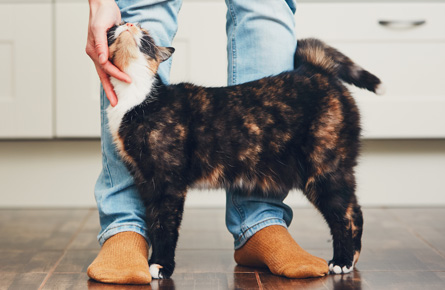 As well as looking out for our own mental wellbeing, it’s also important to keep an eye on your pet’s behaviour and look out for signs of anxiety. Our guide to supporting your pet’s mental health may give you some ideas about how to keep them calm and happy.
As well as looking out for our own mental wellbeing, it’s also important to keep an eye on your pet’s behaviour and look out for signs of anxiety. Our guide to supporting your pet’s mental health may give you some ideas about how to keep them calm and happy.
There’s been a significant increase in the amount of information published on the impact coronavirus news is having on people’s anxiety levels and mental health challenges – and, with many of us unable to leave our homes, social isolation is likely to have a further negative impact on our mental health.
But what about our pets? Their routine is also going to be heavily impacted – reduced exposure to sounds and smells which stimulate their senses, less exercise, and fewer opportunities to interact with other animals will all take a toll on their wellbeing too. You may notice that you pet’s behaviour changes, showing signs of anxiety and frustration as they’re not able to leave their home to explore and play. Being patient and understanding, while testing various interventions to address the concerns may make a period of isolation more manageable.
So, how can you provide additional stimulation at a time when outside access is restricted?
You can exercise with your pet at home
There are several different techniques which can be used to exercise your pet at home – setting up agility activities, teaching your dog something new or buying a new, stimulating toy. Playing with your cat will be essential in reducing their anxiety and stress if there’s a need to keep them indoors.
Play games with your pet
Interacting with your dog or cat will help stimulate their mind. Using a toy, which you can both engage with, will also help you form a stronger relationship with your pet. Consider something you could throw, drag or swing to get their attention and maintain their interest. It will also help keep them active if you’re stuck indoors.
Buy new toys and rotate with their existing ones
There are lots of interactive toys available for both cats and dogs which you can order online and have delivered. By rotating the new and old toys you will keep your pet interested in what they’re playing with. Whether a hide and seek mouse game, or an IQ treat dispensing puzzle – there’s bound to be something available for your pet.
Play hide and seek
Stimulating their senses is important for both dogs’ and cats’ wellbeing. Hiding treats and toys around your home will not only provide mental stimulation but also important exercise at a time when outside access is restricted. You could be the one to hide. Encourage your dog to stay in one room while you hide in another.
Access to light and a window
If you have access to a garden, your pet can continue to get fresh air, light and exposure to different sounds and smells. However, clearing space for them by a window will allow them to watch what’s going on outside – other animals, changes in the weather or traffic passing by. All of this should provide stimulation if you confined to your home. However, you should monitor your pet’s behaviour, as this may heighten their anxiety and frustration at not being able to go outside. If you notice this behaviour start to emerge you may need to change tactic.
Play Pup Fiction
Spotify have launched a ‘My Dog’s Favourite Podcast’ – which has up to 5 hours of ‘soothing sounds and friendly chat’ which is an ‘aural treat’ for your dog.
Check it out
There is lots of evidence that a mentally and physically stimulated pet is happier and healthier. By knowing your pet and observing changes in their behaviour, you will be able to spot whether their mental wellbeing is being impacted by the period of isolation. If you’ve tried several of the techniques we’ve suggested and are concerned that your pet is exhibiting signs of worry or stress then you should contact your vet who will be able to provide you with more advice.
Please ensure you call us or read our latest guidelines in case of an emergency.

